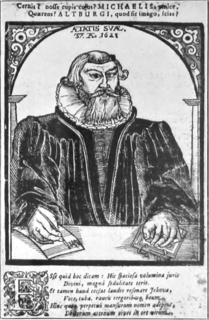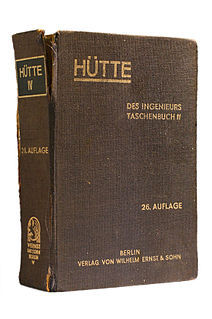Arthur Erich Haas was an Austrian physicist, noted for a 1910 paper he submitted in support of his habilitation as Privatdocent at the University of Vienna that outlined a treatment of the hydrogen atom involving quantization of electronic orbitals, thus anticipating the Bohr model (1913) by three years.
Academic press may refer to:

The Bibliotheca Teubneriana, or Bibliotheca Scriptorum Graecorum et Romanorum Teubneriana, also known as Teubner editions of Greek and Latin texts, comprise one of the most thorough modern collection published of ancient Greco-Roman literature. The series consists of critical editions by leading scholars. They now always come with a full critical apparatus on each page, although during the nineteenth century there were editiones minores, published either without critical apparatuses or with abbreviated textual appendices, and editiones maiores, published with a full apparatus.
Akademie Verlag (AV) is a German scientific and academic publishing company, founded in 1946 in the Soviet-occupied eastern part of divided Berlin to facilitate the publication of works by and for the German Academy of Sciences Berlin.

Michael Altenburg was a German theologian and composer.
The Carl Hanser Verlag was founded in 1928 by Carl Hanser in Munich and is one of the few medium-sized publishing companies in the German-speaking area still owned by the founding family.
D. Reidel was an academic publishing company based in Dordrecht established in the 1960s which was independent until the 1990s.

The Monday demonstrations were a series of peaceful political protests against the government of the German Democratic Republic (GDR) that took place in towns and cities around the country on various days of the week from 1989 to 1991. The Leipzig demonstrations, which are the most well known, took place on Mondays. The protests are conventionally separated into five cycles.

Marcel Marius van der Linden was director of research at the International Institute of Social History until 2014, is now Senior Researcher at the Institute, and also holds a professorship dedicated to the history of social movements at the University of Amsterdam.
The Verlag Harri Deutsch with headquarters in Frankfurt am Main, Germany, as well as in Zürich and Thun, Switzerland, was a German publishing house founded in 1961 and closed in 2013.
Katrin Hattenhauer is a German painter and civil rights activist. In the late 1980s she was a member of the GDR-opposition movement. On 4 September 1989 she demonstrated "For an Open Country with Free People", marking the beginning of the Monday demonstrations in Leipzig. Her paintings and social sculptures have been exhibited in Europe.
Mario Keßler is a German historian.

Jürgen Hamel is a German astronomy historian. His research areas are the history of astronomy in the Middle Ages and the early modern period, the period around 1800, the history of astrophysics, astronomy and cultural history, and the history of astronomical instruments.
The Evangelische Verlagsanstalt (EVA) is a denominational media company founded in Berlin in 1946. Its shareholders are the Gemeinschaftswerk der Evangelischen Publizistik and the Evangelical-Lutheran Church of Saxony. The managing director is Sebastian Knöfel.
The Akademische Druck- und Verlagsanstalt (ADEVA) is an Austrian book publisher in Graz that specialises primarily in publishing lavish facsimile editions.

The Hütte - Das Ingenieurwissen is a reference work for engineers of various disciplines. It was compiled for the first time in 1857 by the Akademischer Verein Hütte of the Königliches Gewerbe-Institut in Berlin, from which the association of German engineers Verein Deutscher Ingenieure (VDI) emerged. The authors were members of the association. The technical illustrations were created in woodcut technique by Otto Ebel. It is published in constantly revised editions to this day and is therefore the oldest German reference work still available today.
Verlag Enzyklopädie was an East-German publishing house located in Leipzig. It was founded on 1 November 1956 by the German Democratic Republic (GDR) as a VEB. In 1964, the publishing house was merged with the larger VEB Bibliographisches Institut (BI), with which it had previously cooperated already, but it retained its legal independence.
Ostwalds Klassiker der exakten Wissenschaften is a German book series that contains important original works from all areas of natural sciences. It was founded in 1889 by the physical chemist Wilhelm Ostwald and is now published by Europa-Lehrmittel.
The Akademische Verlagsgesellschaft in Leipzig was an important German academic publisher, which was founded in 1906.
Edition Leipzig was a publisher in the German Democratic Republic (GDR/DDR), which, for the most part, placed books on Western markets as an export publisher. This was intended to serve representative purposes as well as to procure foreign currency. Today, the publishing house is part of the Seemann Henschel publishing group, which was taken over by Zweitausendeins in October 2017 with a program on regional and cultural history.
This page is based on this
Wikipedia article Text is available under the
CC BY-SA 4.0 license; additional terms may apply.
Images, videos and audio are available under their respective licenses.





